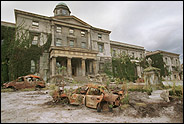McGill in the movies
Dorothy Carruthers, the administrative assistant for the Graduate School of Library and Information Studies, was having a smoke outside her office this spring when she spotted a pair of vaguely familiar figures strolling by.
Returning to work, she noticed an entertainment magazine on a desk and realized who the couple was -- Julia Roberts and Benjamin Bratt. Roberts was visiting Bratt while he was at McGill shooting the film Abandon.
"[Colleague] Kathryn Hubbard said, 'You saw who?! And you didn't come get me?!" relates Carruthers.
At around the same time, Margot Kyle, the administrative assistant for the Admissions, Recruitment and Registrar's Office, was catching up on some work by putting in a few hours on the weekend. Hearing a ruckus outside the James Administration Building, she poked her head out a window and spotted a group of protesters railing against human cloning and a journalist who bore an uncanny resemblance to film star Bridget Fonda. A scene from the film After Amy was being shot.
 This was no accident -- just a scene from John Travolta's Battlefield Earth in 1999
This was no accident -- just a scene from John Travolta's Battlefield Earth in 1999PHOTO: Owen Egan |
|
McGill was a moviemaking hot spot this spring and star spotting was a frequent occurrence as three big Hollywood productions all spent time on campus filming movie sequences, the third being The Sum of All Fears, an action flick starring Ben Affleck as Tom Clancy's ever-resourceful CIA analyst Jack Ryan.
Meanwhile, playing in theatres this summer was the Montreal-shot Robert DeNiro crime caper The Score, which included a scene filmed in the parking garage beneath the McIntyre Medical Sciences Building. And anyone who could tune in to the U.S. TV network UPN was able to catch a spooky ER meets Twin Peaks show called All Souls, which featured a building in its promos that looked an awful lot like the Arts Building -- because it was.
"It's been a great year, one of the best ever," says Debbie Yacoulis, events coordinator for Ancillary Services and the University's chief liaison with moviemakers.
"It's a nice profit for the University, a good sum of money," Yacoulis says of McGill's dealings with moviemakers. Her job requires a careful balancing act. On the one hand, she promotes McGill's versatility as a location for movies and TV shows to the filmmaking industry. On the other hand, she has to be cautious about how she goes about doing that. Anything that gets in the way of the University' s academic mission is a no-go, even if it would result in Bruce Willis or Uma Thurman spending some time on campus.
"Normally we ask for the permission of the dean or building director responsible for an area where someone wants to film," says Yacoulis. "It's up to them to approve."
While most of the income McGill receives from movies goes to the University's central budget, a sizeable chunk is earmarked for the maintenance of the buildings where scenes have been shot.
"There is no way you could make a movie at McGill around exam time," says Alan Davidson, a special events coordinator with the Department of Facilities Management. Films are typically shot during the summer, the Christmas holidays, on weekends or at night.
 McGill staffers who work with movie crews include Shannon Lenhan, Alan Davidson and Brian Duhume from Facilities Management and events coordinator Debbie Yacoulis
McGill staffers who work with movie crews include Shannon Lenhan, Alan Davidson and Brian Duhume from Facilities Management and events coordinator Debbie YacoulisPHOTO: Owen Egan |
|
Yacoulis and Davidson are the McGill staffers involved most intimately with movies being shot at the University. Yacoulis lays down the groundwork, approves the contracts and sets the terms. Davidson often accompanies film location managers as they tour McGill searching for specific settings for film sequences. He and his team also stand by while all the filming actually goes on, in part to help solve problems that might crop up, in part to "make sure they don't go anywhere they aren't supposed to go or do anything they aren't supposed to do," says Davidson. "We're there during the whole shoot."
Davidson says film crews generally behave themselves. "We used to have problems years ago, but the crews are much more professional these days.
"Nobody wants to burn a location," adds Davidson. "If they do serious damage, they won't be back again. The location mana-ger's name is on the line."
And since McGill offers such unique filming opportunities, TV and movie crews want to ensure future access.
"Probably our greatest need is for suitable locations for period pieces," says Adrian Knight, a Montreal-based location manager who has worked on such movies as The Score and John Travolta's Battlefield Earth.
Knight notes that the Faculty Club provided just the right ambience for scenes involving Washington high society in the 1960s in a recent TV miniseries about Jackie Onassis, for instance. McGill also recently provided locations for a Dr. Quinn, Medicine Woman TV movie set in the 1800s -- campus streets were covered in gravel and trod on by horse-drawn carriages.
"I always take people to McGill," says Nicholas Barker, location coordinator for the Montreal TV and Film Office, a City of Montreal organization that actively encourages Hollywood to come to town to make its movies.
He says that McGill's "extraordinary architecture" is always a draw for filmmakers. "When I brought Frank Oz [director of The Score] to McGill, he was fascinated by the Redpath Museum," says Barker. Barker tried to talk the producers of Abandon into shooting some scenes at Concordia University's Loyola campus, thinking it would be easier for them in terms of logistics. "But they insisted on McGill."
Part of McGill's appeal is Yacoulis's professionalism, says Barker. "She is terrific. She keeps tabs on everything. I've never heard any complaints [from filmmakers] about McGill.
"Films can be a pain in the butt," he says, noting that Université de Montréal stopped dealing with moviemakers altogether for a period. Movie crews can be pretty invasive and parking spots, for one thing, disappear once they're on campus.
Barker says Hollywood productions create plenty of jobs for Montrealers and pump U.S. dollars into the city's economy.
"I appreciate that McGill has always kept its doors open."
"That's part of the reason why we get involved," says Yacoulis. "McGill wants to support the film industry in this city."
Knight says his dealings with McGill have always been positive, but he does raise one concern.
"McGill is an expensive location, definitely above average. If you're talking about a big-budget Hollywood production, then there is no problem. But Canadian producers are squeezed out."
"We are one of the most expensive facilities in the city," Yacoulis acknowledges. But the organizing required to play host to a film crew and the disruption caused by a movie being filmed on campus are not insignificant.
McGill charges productions $3,000 a day, the same fee as the University of Toronto and more than what most universities charge. (Montreal's most expensive location, according to Barker, is the ritzy Mount Stephen Club on Drummond.)
That's just the flat rate -- filmmakers also pick up the tab for all McGill expenses related to their presence.
Films shot on campus require the contributions of a range of University employees -- security guards, parking personnel, electricians, porters. Filmmakers typically have to reimburse the University for the movie-related work done by McGill staffers. "There are no gimmes in this. We charge them back for everything," says Davidson.
Yacoulis says she tries to drum up business for other McGill units when a movie is being shot -- she'll make a pitch on behalf of the catering services provided by the Residences, for instance.
Students occasionally get a piece of the action.
Dan Kapeluto, an anatomy and cell biology student, noticed flyers on campus calling for extras just as the Abandon crew was setting up shop. Filling out a form, Kapeluto was asked if he would be willing to dye his hair, shave or smoke a cigarette for the film.
Abandon relates the tale of a university student (played by Dawson's Creek's Katie Holmes) who starts glimpsing an old boyfriend who disappeared two years ago. Benjamin Bratt plays a detective looking into the mystery.
"The film is set at a university and they needed extras to play students. What better people to have playing students than students," posits Kapeluto.
His first scene involved sitting around the terrace outside the Redpath Library Building. Once the stars emerged for filming, Kapeluto says things got exciting. "Just the experience of seeing these people up close was something." But that wore off fairly quickly. "It gets boring and monotonous as they shoot the same scene over and over."
Fan web sites for Katie Holmes were abuzz with several reports about the star's time in Montreal, courtesy of McGill students who got to see her up close. Most agreed that Holmes was reserved, pretty and alarmingly thin. "Even her hair is skinny," opined one McGill student. "She was very into her work and quiet," Kapeluto says. "Bratt was much more outgoing, shaking hands and chatting."
Kapeluto was paid $10 an hour. "I thought it was really easy money. A friend of mine from the U.S. [familiar with the rate for American extras] says we were like slave labour compared to what people get paid there."
Other productions recently filmed at McGill include Stork Derby with Meghan Follows and Pascal Montpetit, The Great Gatsby with Mira Sorvino and Nuremberg with Alec Baldwin.
Yacoulis says she rarely visits a set anymore. "After a while you realize it's just people doing their jobs."
Kapeluto might agree but he still feels some of Hollywood's magical appeal. He reckons he appears in about five scenes in Abandon and while he might not make it up on screen at all, he and some of his fellow extras have already made a date for next May when Abandon is released theatrically. "We're going to get all dressed up and we're bringing our own red carpet."
For a glimpse of McGill locations try these links: Dr Quinn Medicine Woman: A Winter's Heart or All Souls

